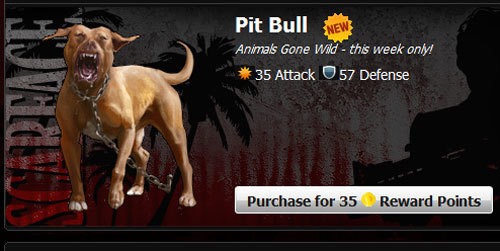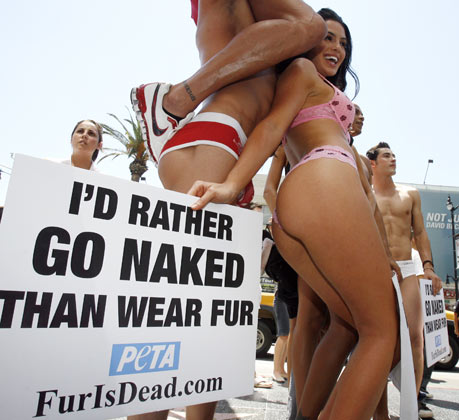This post has not been edited by the GamesBeat staff. Opinions by GamesBeat community writers do not necessarily reflect those of the staff.
Editor's note: As a former vegetarian who is dating a vegan, I am sympathetic to PETA's cause. But when you name your blog the PETA Files, it's really difficult to take you seriously — I'll toss that joke to the reader. Either way, Alex's pro-animal article is a great, candid look at the silliness of criticizing virtual pet abuse. -James

As it does many vegetarians, PETA frequently embarrasses me. The animal rights advocacy group recently complained about Zynga adding pit bulls to Mafia Wars. In a letter to Zynga CEO Mark Pincus, they said:
"Bully breeds" like your beloved late American bulldog, Zinga, are also the breeds of choice for dogfighters and thugs who want a "macho" animal to intimidate others, guard their property, or make them money by winning fights. Every day, PETA staffers meet dogs who have been trapped for years at the end of heavy tractor-trailer chains with nothing but bare patches of dirt and plastic barrels for shelter. These dogs are usually full of heartworms, emaciated, and scarred all over. They are often physically abused and starved, sometimes to death, for losing in illegal dogfights or for being "bad guards" or "not mean enough." The people who acquire them do so because they have been taught that having one of these dogs is "cool" and "tough," but they have no idea about the care and feelings of the animal they have enslaved.
While I'm prepared to believe all of that and agree that dog fighting needs to stop, PETA's pursuit of Zynga bemuses me. Mafia Wars is a game in which you play a mobster — not a model citizen. Players know from the outset that the game involves some dirty deeds — concrete shoes, seedy contracts, and now, attack dogs. No reasonable person will come away from Mafia Wars thinking that dog fights — or any other mob-related activities — are morally acceptable.
I would say that not including pit bulls would be a disservice to the breed and the victims of dog attacks, but Mafia Wars isn't exactly the serious venue of discussion this issue requires. Perhaps games that portray real events in a realistic manner are.
In March 2009, PETA supported a Massachusetts student's petition against the inclusion of attack dogs in Call of Duty: World at War. The student, Breanna Lucci, took issue with Treyarch's depiction of animal murder as entertainment. (Apparently, she had no issue with shooting humans.)
Animals in War Memorial, Hyde Park, London
When Lucci saw her brother playing the game, it horrified her, and I think this may be the issue: People who don't play games often misunderstand that they are not pure revelry in the imagery. Entertainment is the major draw for most mainstream games, but when nongamers see what they think is a gamer's delight in blowing the faces off of puppies, they don't understand that the player is delighting in the righteous thrill of besting a competitor or finishing a goal.
World War II games don't go far enough when portraying the atrocities committed during that conflict. They remain dead-focused on the shooting, and I probably won't play another title in the genre until they address the darker side of the history. We all like to defeat evil, and we don't believe in evil unless we see it. In historical games, developers should show how historic events included animal cruelty. If a developer doesn't show an antagonist's crimes, how is the audience supposed to believe they are evil? In my book, the way that games routinely gloss over the Holocaust is beyond cowardly, and evading any of the war's lesser tragedies is also sidestep. That's the problem– not cartoonish games like Mafia Wars.
PETA acts sensibly on occasion: Their campaign against Ringling Bros. and Barnum and Bailey Circus for Wii and DS is justifiable. I haven't played Ringling Bros. and Barnum and Bailey Circus, but since it's a licensed game, I'm fairly confident it does nothing to highlight the constant abuse of elephants that PETA so staunchly opposes. By all appearances, this game doesn't look like it tries to paint a fair picture of the circus industry. But it's different from Mafia Wars because Zynga isn't actually trying to promote criminals or criminal activities.
PETA also regularly praises animal-friendly games. By portraying vegetarianism in a positive light, Fable 2 and The Sims 3 have earned the organization's approval. Fable developer Lionhead trained players to know that carrots are healthy, meat pies are unhealthy, tofu is good, and crunchy chicks are evil. That was enough for PETA to forgive achievements that rewarded kicking chickens and murdering rabbits. Maxis also gave players the choice to have their Sims go veggie and rewarded them with longer lives for doing so.

When it suits PETA, it's fine with animal abuse in games: The organization uses Flash parodies to spread its message. Cooking Mama: Mama Kills Animals is a gory, turkey-slaughter simulation, and its style is amusing only in its absurdity. It stirs Cooking Mama's cutesy aesthetic with the blood and guts of animal slaughter. They've made knock-offs of Super Mario Bros. and Frogger as well. They're not the most original game designers, but propaganda is often about appropriating old ideas.
They do some good work, but they're so quick to see injustice that they often react disproportionately to harmless depictions of animal cruelty. Mafia Wars trivializes dog fighting as much as it trivializes organized crime. World at War is as cruel to dogs as it is to Japanese soldiers. If you discount those because of what they do to animals, then it follows that you should discount every game that allows people to behave badly, as well as every violent game in a real-world setting. And if we censor all that, we won't get to play very many games.

You deserve this picture for reading this far.

